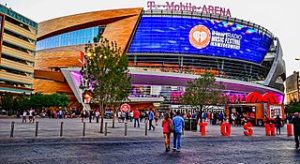The T-Mobile Arena in Las Vegas celebrates it third anniversary in April. If it seems like the 20,000-seat arena has been around longer than that, it should, as the venue has already hosted some of the biggest sporting and concert shows in the world. The National Hockey League also came to Las Vegas and the arena got to host the 2018 Stanley Cup Final between the homestanding Golden Knights against the Washington Capitals. While the final result went in favor of the Capitals, most everything else has been a win in a short period of time.
With success, even for venues, comes higher expectations.
Now, the arena is using customer data in even greater ways, including how to determine how many staff is needed for  specific events and to handle the always sticky situation of traffic in and around the facility. Purchase a ticket online and the venue can answer some of those questions from the purchaser’s data, including addresses from where the buyer will be coming.
specific events and to handle the always sticky situation of traffic in and around the facility. Purchase a ticket online and the venue can answer some of those questions from the purchaser’s data, including addresses from where the buyer will be coming.
Yes, it is an example of technology at its finest and geared to make the guest experience a pleasurable and seamless one.
Online activity has become one of the latest ways for such information to be gathered. Before, most data gathered on patrons arrived from trade publications or getting a guest to stand still for a moment to answer a few survey questions while at the venue. While those still exist to lesser extents, it is the online experience that drives more specific data today.
Crowds at T-Mobile Arena are 70 percent tourists for most events, based on the ZIP codes of purchases. For other events, like Golden Knights games, the mix is 80 percent local — adding that many more cars to parking and traffic around the arena.
That knowledge has helped reduce the time it takes to clear vehicle traffic from surrounding parking garages from 43 minutes to a more palatable 30 minutes.
Inside, technology is king, and the arena does its part to give guests fast connections to do what most customers do these days when attending events — share the experience through social media with friends.
Best for the venue is that those who use internet connection agree to allow data collection, another tool key for not only marketing but enabling T-Mobile Arena to be better equipped to serve and deliver. In all, the arena now has some 750 networking hardware devices that connects guests to the internet.
It is but part of the new experience for both venue and guest, and one example of delivering customer service in a different way.
